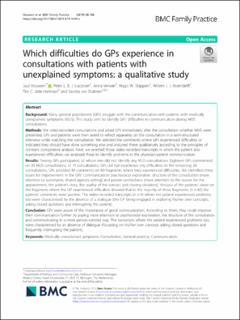| dc.contributor.author | Houwen, Juul | |
| dc.contributor.author | Lucassen, Peter L.B.J. | |
| dc.contributor.author | Verwiel, Anna | |
| dc.contributor.author | Stappers, Hugo W. | |
| dc.contributor.author | Assendelft, Willem J.J. | |
| dc.contributor.author | olde Hartman, Tim C. | |
| dc.contributor.author | van Dulmen, Sandra | |
| dc.date.accessioned | 2020-03-13T13:01:30Z | |
| dc.date.available | 2020-03-13T13:01:30Z | |
| dc.date.created | 2020-02-20T14:56:16Z | |
| dc.date.issued | 2019 | |
| dc.identifier.citation | BMC Family Practice. 2019, 20 (1). | en_US |
| dc.identifier.issn | 1471-2296 | |
| dc.identifier.uri | https://hdl.handle.net/11250/2646757 | |
| dc.description | This article is distributed under the terms of the Creative Commons Attribution 4.0 International License which permits unrestricted use, distribution, and reproduction in any medium, provided you give appropriate credit to the original author(s) and the source, provide a link to the Creative Commons license, and indicate if changes were made. | en_US |
| dc.description.abstract | Background
Many general practitioners (GPs) struggle with the communication with patients with medically unexplained symptoms (MUS). This study aims to identify GPs’ difficulties in communication during MUS consultations.
Methods
We video-recorded consultations and asked GPs immediately after the consultation whether MUS were presented. GPs and patients were then asked to reflect separately on the consultation in a semi-structured interview while watching the consultation. We selected the comments where GPs experienced difficulties or indicated they should have done something else and analysed these qualitatively according to the principles of constant comparative analysis. Next, we selected those video-recorded transcripts in which the patient also experienced difficulties; we analysed these to identify problems in the physician-patient communication.
Results
Twenty GPs participated, of whom two did not identify any MUS consultations. Eighteen GPs commented on 39 MUS consultations. In 11 consultations, GPs did not experience any difficulties. In the remaining 28 consultations, GPs provided 84 comments on 60 fragments where they experienced difficulties. We identified three issues for improvement in the GPs’ communication: psychosocial exploration, structure of the consultation (more attention to summaries, shared agenda setting) and person-centredness (more attention to the reason for the appointment, the patient’s story, the quality of the contact and sharing decisions). Analysis of the patients’ views on the fragments where the GP experienced difficulties showed that in the majority of these fragments (n = 42) the patients’ comments were positive. The video-recorded transcripts (n = 9) where the patient experienced problems too were characterised by the absence of a dialogue (the GP being engaged in exploring his/her own concepts, asking closed questions and interrupting the patient).
Conclusion
GPs were aware of the importance of good communication. According to them, they could improve their communication further by paying more attention to psychosocial exploration, the structure of the consultation and communicating in a more person-centred way. The transcripts where the patient experienced problems too, were characterised by an absence of dialogue (focussing on his/her own concept, asking closed questions and frequently interrupting the patient). | en_US |
| dc.language.iso | eng | en_US |
| dc.rights | Navngivelse 4.0 Internasjonal | * |
| dc.rights.uri | http://creativecommons.org/licenses/by/4.0/deed.no | * |
| dc.title | Which difficulties do GPs experience in consultations with patients with unexplained symptoms: a qualitative study | en_US |
| dc.type | Peer reviewed | en_US |
| dc.type | Journal article | en_US |
| dc.description.version | publishedVersion | en_US |
| dc.rights.holder | © The Author(s). 2019 | en_US |
| dc.source.volume | 20 | en_US |
| dc.source.journal | BMC Family Practice | en_US |
| dc.source.issue | 1 | en_US |
| dc.identifier.doi | 10.1186/s12875-019-1049-x | |
| dc.identifier.cristin | 1796200 | |
| cristin.ispublished | true | |
| cristin.fulltext | original | |
| cristin.qualitycode | 1 | |

